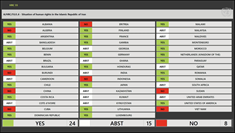UN Human Rights Council adopts resolution on the situation of human rights in the Islamic Republic of Iran
The UN Human Rights Council has adopted a resolution that addresses the situation of human rights in the Islamic Republic of Iran put forward by a core group led by Iceland. The resolution renews the mandate of the Special Rapporteur to monitor and report regularly on the human rights situation in the Islamic Republic of Iran. In addition, it extends for one year the mandate of the independent international fact-finding mission (FFM) which collects, analyses and preserves evidence on serious human rights violations following the death in custody of Jina Mahsa Amini and the subsequent nationwide protests in the autumn of 2022.
Since 2021, Iceland has led an annual resolution on the mandate of the Special Rapporteur on the situation of human rights in the Islamic Republic of Iran. Following the 2022 protest, in which women and girls played a key role, Iceland and Germany called for a Special Session in the Council and put forward a resolution which led to the establishment of the aforementioned FFM.
The 55th session of the Human Rights Council commenced with a high-level segment, in which H.E. Bjarni Benediktsson, Minister for Foreign Affairs of Iceland, addressed the Council. In the session, which is the longest in the history of the Council since its establishment in 2006, thirty-two resolutions and two decisions were adopted. Key mandates adopted this session, in addition to Iceland’s initiative, included the renewal of the Commission of Inquiry on Ukraine stemming from Russia’s aggression, mandate renewal of the Special Rapporteur on the situation of human rights in Belarus and the establishment of a group of three independent experts, and the renewal of three mandates concerning the Occupied Palestinian Territory. Furthermore, the Council adopted a resolution that seeks to protect the rights of intersex persons.
Iceland is running for a seat in the Human Rights Council for the period 2025-2027. As an observer state, Iceland continues to actively engage in the Council. In addition to leading the resolution on the situation on the human rights situation in the Islamic Republic of Iran, Iceland was party to over thirty statements, either in national capacity or together with the Nordic Baltic countries.


